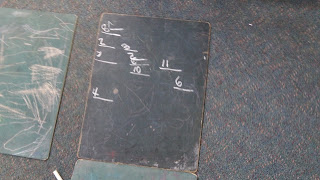Thursday 6th September.
We have recently extended the boundaries, for both the space that we can explore, and the types of activities that we can do. We agreed that climbing trees is ok, as long as we don't go higher than Nerida's head, and only use branches that are thicker than our wrists.
A group of children were extremely concerned about rubbish floating in the water, so we also extended our boundary a little to the edge of the creek, as long as a teacher is present.
The children were combined their fascination with building (and any kind of large stick) and a concern for safety and made a 'hand rail' leading from the top of the hill to the edge of the bank, so that they knew they would be able to climb up again. The children also tried making a bridge across the creek, but were unable to find a stick long enough.
Once we go there, it took quite a while to 'fish' for the polystyrene foam floating up and down the water. This was complicated by the fact that the foam kept changing direction, floating one way and then another. The children decided this was because of the currents and the wind.
After retrieving the rubbish, we tried measuring the depth of the creek, using sticks that we found along the bank and in the water. This was difficult, because many of the sticks were already wet, and so didn't show the point that they had been dipped to. Others were drier and so clearer to see, and we made some approximate measurements using these.
The children are also becoming increasingly fascinated by small details that they find on the plants. Here are a few of their observations:
It feels like soap
It feels like white chocolate to me.
It feels like a kind of silkish, soapish, um...
And it smells weird.
More patterns! It might be worms
I know this is wood worm because of the holes
Why are there all these scratches?
It might be possums or squirrels.
It must be possums because squirrels live in England.
This plant has been eaten. I think it's caterpillars because they eat the leaves.
They are also becoming very keen photographers, it's fascinating to see the things that they observe. Here are a few of the photos of which they are most proud:
Look, it's got purple!
Thank you to Michelle, Mia, Katie and Jeremy who came along with us this week. Thank you also to the little brothers and sisters who came along with the big kids.


















































